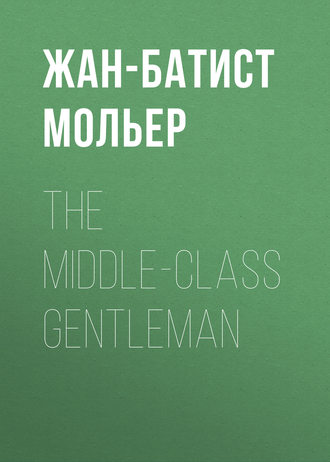
Мольер (Жан-Батист Поклен)
The Middle-Class Gentleman
MONSIEUR JOURDAIN: There are no expenditures I would not make if by that means I might find the road to her heart. A woman of quality has ravishing charms for me and it's an honor I would purchase at any price.
MADAME JOURDAIN: (To Nicole) What can they talk about so much? Steal over and listen a little.
DORANTE: Soon enough you will enjoy at your ease the pleasure of seeing her, and your eyes will have a long time to satisfy themselves.
MONSIEUR JOURDAIN: To be completely free, I have arranged for my wife to go to dinner at her sister's, where she'll spend all the after-dinner hours.
DORANTE: You have done prudently, as your wife might have embarrassed us. I have given the necessary orders to the cook for you, and for the ballet. It is of my own invention; and, provided the execution corresponds to the idea, I am sure it will be found..
MONSIEUR JOURDAIN: (Sees that Nicole is listening, and gives her a slap) Say! You're very impertinent! (To Dorante) Let's go, if you please.
SCENE VII (Madame Jourdain, Nicole)
NICOLE: My faith, Madame, curiosity has cost me; but I believe something's afoot, since they were talking of some event where they did not want you to be.
MADAME JOURDAIN: Today's not the first time, Nicole, that I've had suspicions about my husband. I'm the most mistaken woman in the world, or there's some love-affair in the making. But let us see to my daughter. You know the love Cléonte has for her. He's a man who appeals to me, and I want to help his suit and give him Lucile, if I can.
NICOLE: Truly, Madame, I'm the most delighted creature in the world to see that you feel this way, since, if the master appeals to you, his valet appeals to me no less, and I could wish our marriage made under the shadow of theirs.
MADAME JOURDAIN: Go speak to Cléonte about it for me, and tell him to come to me soon so we can present his request to my husband for my daughter in marriage.
NICOLE: I hasten, Madame, with joy, for I could not receive a more agreeable commission. (Alone) I shall, I think, make them very happy.
SCENE VIII (Cléonte, Covielle, Nicole)
NICOLE: Ah! I'm glad to have found you. I'm an ambassadress of joy, and I come..
CLÉONTE: Get out, traitor, and don't come to amuse me with your treacherous words.
NICOLE: Is this how you receive me..
CLÉONTE: Get out, I tell you, and go tell your faithless mistress that she will never again in her life deceive the too trusting Cléonte.
NICOLE: What caprice is this? My dear Covielle, explain a little what you are trying to say.
COVIELLE: Your dear Covielle, little hussy? Go, quickly, out of my sight, villainess , and leave me in peace.
NICOLE: What! You come to me too..
COVIELLE: Out of my sight, I tell you, and never speak to me again.
NICOLE: My word! What fly has bitten those two? Let's go tell this pretty story to my mistress.
SCENE IX (Cléonte, Covielle)
CLÉONTE: What! Treat a lover in this way? And a lover who is the most faithful and passionate of lovers?
COVIELLE: It is a frightful thing that they have done to us both.
CLÉONTE: I show a woman all the ardor and tenderness that can be imagined; I love nothing in the world but her, and I have nothing but her in my thoughts; she is all I care for, all my desire, all my joy; I talk of nothing but her, I think of nothing but her, I have no dreams but of her, I breathe only because of her, my heart lives wholly in her; and see how so much love is well repaid! I have been two days without seeing her, which are for me two frightful centuries; I meet her by chance; my heart, at that sight, is completely transported, my joy shines on my face; I fly with ecstasy towards her – and the faithless one averts her eyes and hurries by as if she had never seen me in her life!
COVIELLE: I say the same things as you.
CLÉONTE: Covielle, can one see anything to equal this perfidy of the ungrateful Lucile?
COVIELLE: And that, Monsieur, of the treacherous Nicole?
CLÉONTE: After so many ardent homages, sighs, and vows that I have made to her charms!
COVIELLE: After so many assiduous compliments, cares, and services that I rendered her in the kitchen!
CLÉONTE: So many tears I have shed at her knees!
COVIELLE: So many buckets of water I have drawn for her!
CLÉONTE: So much passion I have shown her in loving her more than myself!
COVIELLE: So much heat I have endured in turning the spit for her!
CLÉONTE: She flies from me in disdain!
COVIELLE: She turns her back on me!
CLÉONTE: It is perfidy worthy of the greatest punishments.
COVIELLE: It is treachery that merits a thousand slaps.
CLÉONTE: Don't think, I beg you, of ever speaking in her favor to me.
COVIELLE: I, sir? God forbid!
CLÉONTE: Never come to excuse the action of this faithless woman.
COVIELLE: Have no fear.
CLEONTE; No, you see, all your speeches in her defense will serve no purpose.
COVIELLE: Who even thinks of that?
CLÉONTE: I want to conserve my resentment against her and end all contact with her.
COVIELLE: I agree.
CLÉONTE: This Count who goes to her house is perhaps pleasant in her view; and her mind, I well see, allows itself to be dazzled by social standing. But it is necessary for me, for my honor, to prevent the scandal of her inconstancy. I want to break off with her first and not leave her all the glory of dumping me.
COVIELLE: That's very well said, and I agree, for my part, with all your feelings.
CLÉONTE: Strengthen my resentment and aid my resolve against all the remains of love that could speak in her behalf. Tell me, I order you, all the bad you can of her; make for me a painting of her that will render her despicable; and show well, in order to disgust me, all the faults that you can see in her.
COVIELLE: Her, sir? There's a pretty fool, a well made flirt for you to give so much love! I see only mediocrity in her, and you will find a hundred women who will be more worthy of you. First of all, she has small eyes.
CLÉONTE: That's true, she has small eyes; but they are full of fire, the brightest, the keenest in the world, the most touching eyes that one can see.
COVIELLE: She has a big mouth.
CLÉONTE: Yes; but upon it one sees grace that one never sees on other mouths; and the sight of that mouth, which is the most attractive, the most amorous in the world, inspires desire.
COVIELLE: As for her figure, she's not tall.
CLÉONTE: No, but she is graceful and well made.
COVIELLE: She affects a nonchalance in her speech and in her actions.
CLÉONTE: That's true; but she may be forgiven all that, for her manners are so engaging, they have an irresistible charm.
COVIELLE: As to her wit..
CLÉONTE: Ah! She has that, Covielle, the finest, the most delicate!
COVIELLE: Her conversation..
CLÉONTE: Her conversation is charming.
COVIELLE: She is always serious..
CLEONTE; Would you have grinning playfulness, constant open merriment? And do you see anything more impertinent than those women who laugh all the time?
COVIELLE: But finally she is as capricious as any woman in the world.
CLÉONTE: Yes, she is capricious, I concede; but everything becomes beautiful ladies well, one suffers everything for beauty.
COVIELLE: I see clearly how it goes, you want to go on loving her.
CLÉONTE: Me, I'd like better to die; and I am going to hate her as much as I loved her.
COVIELLE: How, if you find her so perfect?
CLÉONTE: That's how my vengeance will be more striking, in that way I'll show better the strength of my heart, by hating her, by quitting her, with all her beauty, all her charms, and as lovable as I find her. Here she is.
SCENE X (Cléonte, Lucile, Covielle, Nicole)
NICOLE: For my part, I was completely shocked at it.
LUCILE: It can only be, Nicole, what I told you. But there he is.
CLÉONTE: I don't even want to speak to her.
COVIELLE: I'll imitate you.
LUCILE: What's the matter Cléonte? What's wrong with you?
NICOLE: What's the matter with you, Covielle?
LUCILE: What grief possesses you?
NICOLE: What bad humor holds you?
LUCILE: Are you mute, Cléonte?
NICOLE: Have you lost your voice, Covielle?
CLÉONTE: Is this not villainous!
COVIELLE: It's a Judas!
LUCILE: I clearly see that our recent meeting has troubled you.
CLÉONTE: Ah! Ah! She sees what she's done.
NICOLE: Our greeting this morning has annoyed you.
COVIELLE: She has guessed the problem.
LUCILE: Isn't it true, Cléonte, that this is the cause of your resentment?
CLÉONTE: Yes, perfidious one, it is, since I must speak; and I must tell that you shall not triumph in your faithlessness as you think, I want to be the first to break with you, and you won't have the advantage of driving me away. I will have difficulty in conquering the love I have for you; it will cause me pain; I will suffer for a while. But I'll come through it, and I would rather stab myself through the heart than have the weakness to return to you.
COVIELLE: Me too.
LUCILE: What an uproar over nothing. I want to tell you, Cléonte, what made me avoid joining you this morning.
CLÉONTE: No, I don't want to listen to anything..
NICOLE: I want to tell you what made us pass so quickly.
COVIELLE: I don't want to hear anything.
LUCILE: (Following Cléonte) Know that this morning..
CLÉONTE: No, I tell you.
NICOLE: (Following Covielle) Learn that..
COVIELLE: No, traitor.
LUCILE: Listen.
CLÉONTE: I won't listen.
NICOLE: Let me speak.
COVIELLE: I'm deaf.
LUCILE: Cléonte!
CLÉONTE: No.
NICOLE: Covielle!
COVIELLE: I won't listen.
LUCILE: Stop.
CLÉONTE: Gibberish!
NICOLE: Listen to me.
COVIELLE: Rubbish!
LUCILE: One moment.
CLÉONTE: Never.
NICOLE: A little patience.
COVIELLE: Not interested!
LUCILE: Two words.
CLÉONTE: No, you've had them.
NICOLE: One word.
COVIELLE: No more talking.
LUCILE: Alright! Since you don't want to listen to me, think what you like, and do what you want.
NICOLE: Since you act like that, make whatever you like of it all.
CLÉONTE: Let us know the reason, then, for such a fine reception.
LUCILE: It no longer pleases me to say.
COVIELLE: Let us know something of your story.
NICOLE: I, myself, no longer want to tell you.
CLÉONTE: Tell me..
LUCILE: No, I don't want to say anything.
COVIELLE: Tell it..
NICOLE: No, I'll tell nothing.
CLÉONTE: For pity..
LUCILE: No, I say.
COVIELLE: Have mercy.
NICOLE: It's no use.
CLÉONTE: I beg you.
LUCILE: Leave me..
COVIELLE: I plead with you.
NICOLE: Get out of here.
CLÉONTE: Lucile!
LUCILE: No.
COVIELLE: Nicole!
NICOLE: Never.
CLÉONTE: In the name of God!..
LUCILE: I don't want to.
COVIELLE: Talk to me.
NICOLE: Definitely not.
CLÉONTE: Clear up my doubts.
LUCILE: No, I'll do nothing.
COVIELLE: Relieve my mind!
NICOLE: No, I don't care to.
CLÉONTE: Alright! since you are so little concerned to take me out of my pain and to justify yourself for the shameful treatment you gave to my passion, you are seeing me, ingrate, for the last time, and I am going far from you to die of sorrow and love.
COVIELLE: And I – I will follow in his steps.
LUCILE: Cléonte!
NICOLE: Covielle!
CLÉONTE: What?
COVIELLE: Yes?
LUCILE: Where are you going?
CLÉONTE: Where I told you.
COVIELLE: We are going to die.
LUCILE: You are going to die, Cléonte?
CLÉONTE: Yes, cruel one, since you wish it.
LUCILE: Me! I wish you to die?
CLÉONTE: Yes, you wish it.
LUCILE: Who told you that?
CLÉONTE: Is it not wishing it when you don't wish to clear up my suspicions?
LUCILE: Is it my fault? And, if you had wished to listen to me, would I not have told you that the incident you complain of was caused this morning by the presence of an old aunt who insists that the mere approach of a man dishonors a woman – an aunt who constantly delivers sermons to us on this text, and tells us that all men are like devils we must flee?
NICOLE: There's the key to the entire affair.
CLÉONTE: Are you sure you're not deceiving me, Lucile?
COVIELLE: Aren't you making this up?
LUCILE: There's nothing more true.
NICOLE: It's the absolute truth.
COVIELLE: Are we going to give in to this?
CLÉONTE: Ah! Lucile, how with a word from your lips you are able to appease the things in my heart, and how easily one allows himself to be persuaded by the people one loves!
COVIELLE: How easily we are manipulated by these blasted minxes!
SCENE XI (Madame Jourdain, Cléonte, Lucile, Covielle, Nicole)
MADAME JOURDAIN: I am very glad to see you, Cléonte and you are here at just the right time. My husband is coming, seize the opportunity to ask for Lucile in marriage.
CLÉONTE: Ah! Madame, how sweet that word is to me, and how it flatters my desires! Could I receive an order more charming, a favor more precious?
SCENE XII (Monsieur Jourdain, Madame Jourdain, Cléonte, Lucile, Covielle, Nicole)
CLÉONTE: Sir, I did not want to use anyone to make a request of you that I have long considered. It affects me enough for me to take charge of it myself; and, without further ado, I will say to you that the honor of being your son-in-law is a glorious favor that I beg you to grant me.
MONSIEUR JOURDAIN: Before giving you a reply, sir, I beg to ask if you are a gentleman.
CLÉONTE: Sir, most people don't hesitate much over this question. They use the word carelessly. They take the name without scruple, and the usage of today seems to validate the theft. As for me, I confess to you, I have a little more delicate feelings on this matter. I find all imposture undignified for an honest man, and that there is cowardice in disguising what Heaven made us at birth; to present ourselves to the eyes of the world with a stolen title; to wish to give a false impression. I was born of parents who, without doubt, held honorable positions. I have six years of service in the army, and I find myself established well enough to maintain a tolerable rank in the world; but despite all that I certainly have no wish to give myself a name to which others in my place might believe they could pretend, and I will tell you frankly that I am not a gentleman.
MONSIEUR JOURDAIN: Shake hands, Sir! My daughter is not for you.
CLÉONTE: What?
MONSIEUR JOURDAIN: You are not a gentleman. You will not have my daughter.
MADAME JOURDAIN: What are you trying to say with your talk of gentleman? Are we ourselves of the line of St. Louis?
MONSIEUR JOURDAIN: Quiet, wife, I see what you are up to.
MADAME JOURDAIN: Aren't we both descended from good bourgeois families?
MONSIEUR JOURDAIN: There's that hateful word!
MADAME JOURDAIN: And wasn't your father a merchant just like mine?
MONSIEUR JOURDAIN: Plague take the woman! She never fails to do this! If your father was a merchant, so much the worse for him! But, as for mine, those who say that are misinformed. All that I have to say to you is, that I want a gentleman for a son-in-law.
MADAME JOURDAIN: It's necessary for your daughter to have a husband who is worthy of her, and it's better for her to have an honest rich man who is well made than an impoverished gentleman who is badly built.
NICOLE: That's true. We have the son of a gentleman in our village who is the most ill formed and the greatest fool I have ever seen.
MONSIEUR JOURDAIN: Hold your impertinent tongue! You always butt into the conversation. I have enough money for my daughter, I need only honor, and I want to make her a marchioness.
MADAME JOURDAIN: A marchioness?
MONSIEUR JOURDAIN: Yes, marchioness.
MADAME JOURDAIN: Alas! God save me from it!
MONSIEUR JOURDAIN: It's a thing I have resolved.
MADAME JOURDAIN: As for me, it's a thing I'll never consent to. Marriages above one's station are always subject to great inconveniences. I have absolutely no wish for a son-in-law who can reproach her parents to my daughter, and I don't want her to have children who will be ashamed to call me their grandmother. If she arrives to visit me in the equipage of a great lady and if she fails, by mischance, to greet someone of the neighborhood, they wouldn't fail immediately to say a hundred stupidities. "Do you see," they would say, "this madam marchioness who gives herself such glorious airs? It's the daughter of Monsieur Jourdain, who was all too glad, when she was little, to play house with us; she's not always been so haughty as she now is; and her two grandfathers sold cloth near St. Innocent's Gate. They amassed wealth for their children, they're paying dearly perhaps for it now in the other world, and one can scarcely get that rich by being honest." I certainly don't want all that gossip, and I want, in a word, a man who will be obliged to me for my daughter and to whom I can say, "Sit down there, my son-in-law, and have dinner with me."
MONSIEUR JOURDAIN: Surely those are the sentiments of a little spirit, to want to remain always in a base condition. Don't talk back to me: my daughter will be a marchioness in spite of everyone. And, if you make me angrier, I'll make a duchess of her.
MADAME JOURDAIN: Cléonte, don't lose courage yet. Follow me, my daughter, and tell your father resolutely that, if you can't have him, you don't want to marry anyone.
SCENE XIII (Cléonte, Covielle)
COVIELLE: You've made a fine business, with your pretty sentiments.
CLÉONTE: What do you want? I have a scruple about that which precedent cannot conquer.
COVIELLE: Don't you make a fool of yourself by taking it seriously with a man like that? Don't you see that he is a fool? And would it cost you anything to accommodate yourself to his fantasies?
CLÉONTE: You're right. But I didn't believe it necessary to prove nobility in order to be Monsieur Jourdain's son-in-law.
COVIELLE: Ha, ha, ha!
CLÉONTE: What are you laughing at?
COVIELLE: At a thought that just occurred to me of how to play our man a trick and help you obtain what you desire.
CLÉONTE: How?
COVIELLE: The idea is really funny.
CLÉONTE: What is it?
COVIELLE: A short time ago there was a certain masquerade which fits here better than anything, and that I intend to make part of a prank I want to play on our fool. It all seems a little phony; but, with him, one can try anything, there is hardly any reason to be subtle, and he is the man to play his role marvelously and to swallow easily any fabrication we want to tell him. I have the actors, I have the costumes ready, just leave it to me.
CLÉONTE: But tell me..
COVIELLE: I am going to instruct you in everything. Let's go, there he is, returning.
SCENE XIV (Monsieur Jourdain, Lackey)
MONSIEUR JOURDAIN: What the devil is this? They have nothing other than the great lords to reproach me with, and as for me, I see nothing so fine as to associate with the great lords; there is only honor and civility among them, and I would have given two fingers of a hand to have been born a count or a marquis.
LACKEY: Sir, here's the Count, and he has a lady with him.
MONSIEUR JOURDAIN: What! My Goodness, I have some orders to give. Tell them I'll be back here soon.
SCENE XV (Dorimène, Dorante, Lackey)
LACKEY: Monsieur says that he'll be here very soon.







